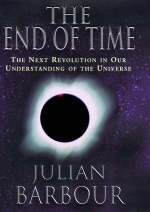
The End of Time
Seiten
1999
Weidenfeld & Nicolson (Verlag)
978-0-297-81985-1 (ISBN)
Weidenfeld & Nicolson (Verlag)
978-0-297-81985-1 (ISBN)
- Titel ist leider vergriffen;
keine Neuauflage - Artikel merken
In this title, a theoretical physicist argues that the solution to the ultimate question in science - how to unify Einstein's theory of general relativity with quantum mechanics - is possible only if we abolish time from the foundations of the universe. In other words, despite our deepest intuitions, time does not exist.
Time is an illusion. Although the laws of physics create a powerful impression that time is flowing, in fact there are only timeless 'nows'. In The End of Time, the British theoretical physicist Julian Barbour describes the coming revolution in our understanding of the world: a quantum theory of the universe that brings together Einstein's general theory of relativity - which denies the existence of a unique time - and quantum mechanics - which demands one. Barbour believes that only the most radical of ideas can resolve the conflict between these two theories: that there is, quite literally, no time at all. The End of Time is the first full-length account of the crisis in our understanding that has enveloped quantum cosmology. Unifying thinking that has never been brought together before in a book for the general reader, Barbour reveals the true architecture of the universe and demonstrates how physics is coming up sharp against the extraordinary possibility that the sense of time passing emerges from a universe that is timeless.
The heart of the book is the author's lucid description of how a world of stillness can appear to be teeming with motion: in this timeless world where all possible instants coexist, complex mathematical rules of quantum mechanics bind together a special selection of these instants in a coherent order that consciousness perceives as the flow of time. Finally, in a lucid and eloquent epilogue, the author speculates on the philosophical implications of his theory: Does free will exist? Is time travel possible? How did the universe begin? Where is heaven? Does the denial of time make life meaningless? Written with exceptional clarity and elegance, this profound and original work presents a dazzlingly powerful argument that all will be able to follow, but no-one with an interest in the workings of the universe will be able to ignore.
Time is an illusion. Although the laws of physics create a powerful impression that time is flowing, in fact there are only timeless 'nows'. In The End of Time, the British theoretical physicist Julian Barbour describes the coming revolution in our understanding of the world: a quantum theory of the universe that brings together Einstein's general theory of relativity - which denies the existence of a unique time - and quantum mechanics - which demands one. Barbour believes that only the most radical of ideas can resolve the conflict between these two theories: that there is, quite literally, no time at all. The End of Time is the first full-length account of the crisis in our understanding that has enveloped quantum cosmology. Unifying thinking that has never been brought together before in a book for the general reader, Barbour reveals the true architecture of the universe and demonstrates how physics is coming up sharp against the extraordinary possibility that the sense of time passing emerges from a universe that is timeless.
The heart of the book is the author's lucid description of how a world of stillness can appear to be teeming with motion: in this timeless world where all possible instants coexist, complex mathematical rules of quantum mechanics bind together a special selection of these instants in a coherent order that consciousness perceives as the flow of time. Finally, in a lucid and eloquent epilogue, the author speculates on the philosophical implications of his theory: Does free will exist? Is time travel possible? How did the universe begin? Where is heaven? Does the denial of time make life meaningless? Written with exceptional clarity and elegance, this profound and original work presents a dazzlingly powerful argument that all will be able to follow, but no-one with an interest in the workings of the universe will be able to ignore.
Julian Barbour has worked on foundational issues in physics for 35 years, making important and original contributions to the theory of time and motion. Author of Absolute or Relative Motion?, a much-praised book on the history of science, he has contributed to several recent major television and radio programmes that have been broadcast worldwide. He is exceptional in having a leading reputation in the field while holding no academic position.
| Erscheint lt. Verlag | 30.9.1999 |
|---|---|
| Zusatzinfo | 10 line drawings |
| Verlagsort | London |
| Sprache | englisch |
| Maße | 165 x 242 mm |
| Gewicht | 734 g |
| Themenwelt | Geschichte ► Hilfswissenschaften ► Chronologie |
| Naturwissenschaften ► Physik / Astronomie ► Astronomie / Astrophysik | |
| Naturwissenschaften ► Physik / Astronomie ► Quantenphysik | |
| Naturwissenschaften ► Physik / Astronomie ► Relativitätstheorie | |
| ISBN-10 | 0-297-81985-2 / 0297819852 |
| ISBN-13 | 978-0-297-81985-1 / 9780297819851 |
| Zustand | Neuware |
| Haben Sie eine Frage zum Produkt? |
Mehr entdecken
aus dem Bereich
aus dem Bereich
Buch | Hardcover (2012)
Westermann Schulbuchverlag
34,95 €
Schulbuch Klassen 7/8 (G9)
Buch | Hardcover (2015)
Klett (Verlag)
30,50 €
Buch | Softcover (2004)
Cornelsen Verlag
25,25 €


